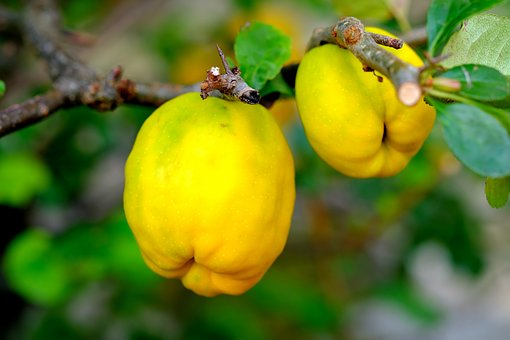Ibn al-Qayyim: Quinces are Beneficial When Eaten Cooked

Ibn al-Qayyim said that the seeds of the quince were beneficial for curing hoarseness of the throat and trachea, and for many illnesses. He said that their oil could prevent sweating, strengthen the stomach and liver, and fortify the heart.
What Are Quinces?
The quince is a golden yellow, pear-shaped and highly scented fruit related to the apple and pear. It belongs to the pome fruit family, which means that it produces fruit by flowering plants.
Quinces are a good source of Vitamin A, fiber and iron. They have a strong, astringent flavor and a hard flesh, so they are not usually eaten raw.
Health Benefits
The Chinese quince may be beneficial for gastric ulcers. Researchers from Shinshu University, Japan, found that Chinese quinces and quince phenolics (chemical compounds) were found to suppress the occurrence of gastric lesions in rats.
The Chinese quince may also have anti-viral health benefits. The phenolics found in this variety of quince showed the strongest anti-influenza viral activity, as well as having superior antioxidant functions.
Tips on Using Quinces
- Select fruit that are large, firm, and yellow with little or no green.
- Wrap quinces in a plastic bag and refrigerate them for up to 2 months.
- Quinces must be handled carefully as they bruise easily.
- Because of their high pectin content, quinces are particularly popular for use in jams, jellies, and preserves. They tend to hold their shape, so they are ideal for poaching, stewing, or baking as a dessert.
References for further reading
- Hamauzu Y, et al, antioxidant and antiulcerative properties of phenolics from Chinese quince, quince, and apple fruits.J Agric Food Chem. 2006 Feb 8;54(3):765-72.
- Hamauzu Y, et al, Phenolic profile, antioxidant property, and anti-influenza viral activity of Chinese quince (Pseudocydonia sinensis Schneid.), quince (Cydonia oblonga Mill.), and apple (Malus domestica Mill.) fruits.J Agric Food Chem. 2005 Feb 23;53(4):928-34.
Link to this article: Show: HTML Link • Full Link • Short Link
Share or Bookmark this page: You will need to have an account with the selected service in order to post links or bookmark this page.





|
Related Articles:
Add a Comment
You must be registered and logged in to comment.
Most Popular
Latest Articles
Popular Subjects
Health, fitness and longevity
Based upon the principles of health
in the Qur'an and Prophetic Traditions.
HealthyMuslim.Com
There are two bounties in which
most people lose out: good health
and free time. Al-Bukhari.























